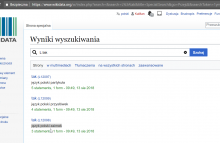Problem:
We are not consistent in how we separate language and lexical category.
Examples:
On tooltip of Lexeme there is comma separator between language and lexical category:
On search results there is no separator between language and lexical category:
And no separator in the entity selector:
Acceptance criteria:
- We consistently separate language and lexicographical category with a localizable comma in all 3 places.


